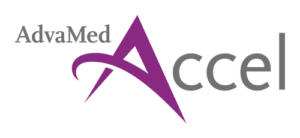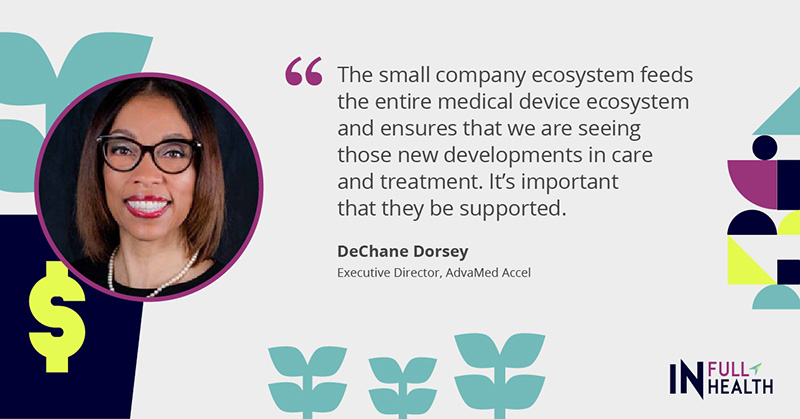 DeChane Dorsey (she/her) is the Executive Director for AdvaMed Accel. AdvaMed Accel supports small and emerging-growth companies in the medtech industry.
DeChane Dorsey (she/her) is the Executive Director for AdvaMed Accel. AdvaMed Accel supports small and emerging-growth companies in the medtech industry.
DeChane is also the former Director of Health Policy for the American Academy of Ophthalmology and Senior Counsel in the Office of Counsel to the Inspector General within the U.S. Department of Health and Human Services.
When it comes to creating more equitable systems for health innovation, investing isn’t just about the money. It’s also about the time, support, and policies that can help small medtech companies grow and thrive.
In this third part of the Investing Cheat Codes series, DeChane shares how she has seen the health care medtech industry change — and what is needed to help it continue evolving.
Read Part 2 of the Investing Cheat Codes Series with Andrey Ostrovsky and Social Innovation Ventures.
In Full Health (IFH): Tell us about your experience with AdvaMed Accel supporting companies that may be smaller or less established. What and who are you excited about — and why is this work important?
DeChane Dorsey: AdvaMed Accel’s small companies represent about 70% of AdvaMed’s overall membership — but many of them are names that no one knows yet. These companies produce cutting-edge devices that will either become bigger companies with recognizable names or eventually be acquired by larger companies. These small companies develop products that are integral in moving the patient care pipeline forward. It’s so exciting to work with them because you see a lot of fresh ideas and passionate leaders dedicated to improving care.
The small company ecosystem feeds the entire medical device ecosystem and ensures that we are seeing those new developments in care and treatment. It’s important that they be supported.
SUBSCRIBE
Stay in the loop about new blog posts from equitable health innovation leaders, helpful resources and tools to help you bring the Principles to life, upcoming events, and more by joining our email list.
SUBSCRIBEIFH: What are the risks of investing without racial, gender, or other equity lenses? What is being left on the table by organizations that are not moving in this direction?
DeChane Dorsey: Health equity is top of mind for the federal agencies that make the policies. These policies will ultimately determine how patients receive care and what care they allow patients to receive. So, it’s critically important for our members — and all health solution developers — to understand what the potential impact may be.
I’ve been doing this work since 2020, and have noticed many initiatives coming out of federal agencies. The U.S. Food and Drug Administration (FDA) has health equity as a strategic pillar, and they are developing clinical trial diversity plan guidance. Centers for Medicare & Medicaid Services (CMS) also has health equity as a strategic pillar, and they are continuing to make health equity a key component of how they’re evaluating their coverage and other decisions.
If you don’t have coverage, you don’t get your device into the market and your device doesn’t get to the patients who need it. If you aren’t enrolling a representative population of patients to engage in clinical trials, research, and development of your product — that could have a long-term impact on whether or not the FDA will ultimately clear and approve these products.
IFH: What about from a patient perspective?
DeChane Dorsey: As an African American woman, it is personally important to me that devices be developed for the full range of patients who will use them. That means taking into account race, ethnicity, gender, sexual orientation, urban and rural geographies, and disability status — all of these populations need to be included in the development of these products in order to know that these products are not only performing as they should but also are being picked up and adopted by the full range of populations.

Community Connections
I am so grateful for the IFH leaders and community. I would love to shout out Dr. Chris Gibbons and Dr. Aletha Maybank. As I’ve done more in this space, I am always amazed by their ideas and out-the-box thinking. I have really been honored to have the AMA and In Full Health pull me into these discussions and be invited to be a part of the larger discussion around health equity.
DeChane Dorsey
Executive Director, AdvaMed Accel
IFH: How have you seen companies that work with AdvaMed Accel grow and develop over time? What unique aspects of your model have led to this growth?
DeChane Dorsey: We support large companies, small companies, and everything in between when it comes to company size. Since its formation, we’ve seen AdvaMed Accel members move past the small-company phase to the mid-size company phase, and even into the large-size company phase.
One example is ABIOMED, for instance. When I first started working at AdvaMed and was still in our payment division, they were a small company. Over the years, they were able to fully utilize the tools available through Accel and the overarching membership to build out their devices and make significant inroads into the cardiovascular space. Just last year, they were acquired by Johnson & Johnson which is proof positive that their device has been showing positive progress.
Over the years since I’ve been at AdvaMed, it’s been incredible to see these companies grow, thrive, move, get acquired, or become their own functioning mid- and large-size company. To see some companies move from those very early phases of getting FDA approval all the way through the pipeline to having coding, coverage, actual use, uptake, and name recognition on the back end is such an honor.
IFH: AdvaMed Accel supports individual companies while also advocating regulatory and payment policies. What changes need to be made to support patient access to innovation and for an environment conducive to capital formation?
DeChane Dorsey: One of the things that is beneficial to small companies is having a regulatory framework that recognizes the challenges of small companies. This can mean understanding that these small companies are simply new to the process. It’s key then to make sure that there are programs in place that acknowledge and assist.
The FDA has recently launched a pilot program called the Total Product Lifecycle Advisory Program (TAP). TAP is designed to help companies with designated breakthrough products navigate the FDA. We know that these breakthrough designated products tend to be products that serve patients with unique health conditions — these are very limited populations of patients with a condition that has very limited alternatives for treating the disease state or symptoms that the patients face. Something like the TAP pilot program is going to be critical in ensuring that patients are getting the care that they need.
SUBSCRIBE
Stay in the loop about new blog posts from equitable health innovation leaders, helpful resources and tools to help you bring the Principles to life, upcoming events, and more by joining our email list.
SUBSCRIBE


Comments are closed.